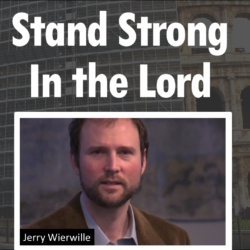 How did Jews at the time of Jesus understand their relationship to the Law? Did they believe in “works righteousness”–the idea that only by obeying the commandments of Torah could they earn salvation? Did they believe in grace? Jerry Wierwille leads us through this important issue so that we contextualize the epistles of Paul within their own thought-world. Drawing on the work of Krister Stendahl, E. P. Sanders, and James D. G. Dunn, Wierwille presents the view known as covenantal nomism, often associated with the new perspective on Paul.
How did Jews at the time of Jesus understand their relationship to the Law? Did they believe in “works righteousness”–the idea that only by obeying the commandments of Torah could they earn salvation? Did they believe in grace? Jerry Wierwille leads us through this important issue so that we contextualize the epistles of Paul within their own thought-world. Drawing on the work of Krister Stendahl, E. P. Sanders, and James D. G. Dunn, Wierwille presents the view known as covenantal nomism, often associated with the new perspective on Paul.
—— Links ——
- Listen to Wierwille’s previous interviews here
- Check out these sermons and articles on Wierwille’s website (JerryWierwille.com)
- Intro music: Jazzy Frenchy by bensound.com. Licensed under Creative Commons: By Attribution 3.0 License.







Hi Sean, I began to listen to this episode of Paul and Covenantal Nomism with disinterest, thinking I already had the Apostle Paul’s view on matters, that there was nothing new really to be learnt, and that this episode was going to be just a convoluted dry scholastic historical review looking at some of the background up to today. This was how I thought up until about 15 minutes from the end when Jerry mentioned that Paul argued that the New Covenant was distinct but not against the Law covenant that my ears really started to listen! What Jerry was explaining was only starting to make sense to me. This idea was something radically different to what I thought. From the beginning you and Jerry were discussing this idea up until that point but it was not sinking in. At the end I excitedly replayed the whole interview, listening intently to the discussion! And now I am on tender-hooks waiting for the next episode for the discussion to continue around Galatians. I think this is epic, it really never ceases to amaze me how we can have these in-grained and preconceived ideas about some things when reading the scriptures until someone like Jerry pulls some material together and gives us something to consider that is a real game changer. Thank you guys keep up the good work.
Look forward to hearing more from Jerry. Thanks for sharing this interview. I like how you’re branching out into many other topics that are somewhat controversial with this podcast(not that unitarianism already isnt).
You don’t have to read any of this below out loud on the podcast, this is more directly a comment to Sean:
I listened to this yesterday while driving so I don’t perfectly recall all your comments at the end but this interview(and hopefully the next one) is exactly the type of stuff I keep on my plate on the side to read/study. I may be somewhat pro-Torah, but as I said before I’m still trying to figure that out with preterism and how it works with Gentiles(mainly based on Matthew 5 comments by Jesus about how not one jot/tittle will pass away til heaven/earth pass away). I’ve not stuck a stake in the ground on this subject so I might sound like I play a bit of a devil’s advocate when commenting and interacting. Mainly about 2 years or so ago I was almost convinced of becoming fully pro-Torah but around that time preterism was something I was beginning to catch as I allowed the “words” of the Scripture spoken to mean what they meant to those whom they were spoken to in that historical time period instead of reading them anachronistically to be about me necessarily. That’s why I keep mentioning it, not because I want to flood your post/podcasts about it—I’m definitely no expert on these subjects. I just feel like I sit at the middle of rock and a hard place with these two topics of the Torah and preterism because they intertwine so much in their conclusions. I don’t get to interact much with others about it either so it’s good to get some dialogue going about it to get my thoughts out. Thank you!
It’s always a pleasure to hear interviews with Jerry Wierwille. I’m dubious that I’ll really enjoy his explanation of Galatians but it should be a fun interview regardless. Maybe one day you could interview a scholar from the Paul Within Judaism school. The NPP doesn’t really go as far as it should, whereas PWJ, in my opinion, asks better questions and in turn, gets better answers. It would be good to hear Jerry present the typical explanation of Gal 2, and then maybe have Mark Nanos, someone who really specializes in this area and who has written at least 5 papers on this text alone, on for an interview. I could probably arrange this as Mark and I talk frequently.